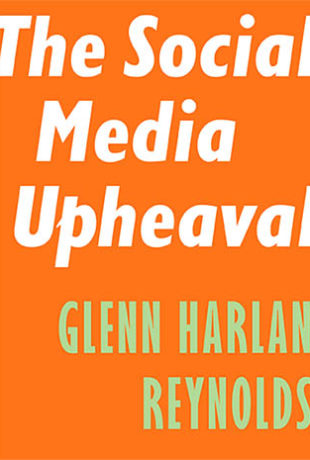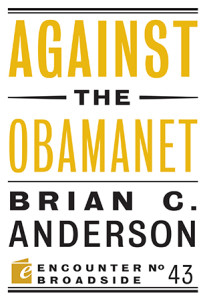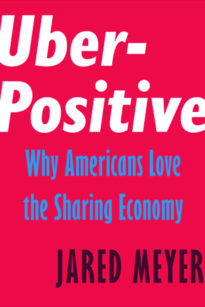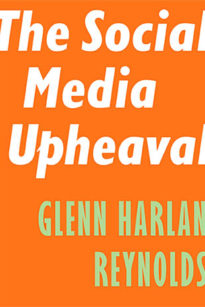Social media giants are poisoning our journalism, our politics, our relationships and ultimately our minds. Glenn Reynolds looks at the up and downsides of social media and at proposals for regulation, and offers his own fix that respects free speech while reducing social media’s toll.
Free shipping on all orders over $40
The Social Media Upheaval

Publication Details
Paperback/ 68 Pages
ISBN: 9781641770835
Available: 5/28/2019
- Media: Request a Review Copy
- Academia: Request an Exam Copy
About the Author
Glenn Harlan Reynolds is the Beauchamp Brogan Distinguished Professor of Law at the University of Tennessee. He blogs at InstaPundit.com and writes for such publications as The Atlantic, Forbes, Popular Mechanics, The Wall Street Journal, and USA Today.
Excerpt
The information world is undergoing a transformation, and it’s huge.
How huge? Huge enough that its impact is comparable to the introduction of agriculture, with similarly far-reaching effects on human civilization. And like the introduction of agriculture, though its impact may be positive overall, there will be significant costs along with the benefits, and neither the costs nor the benefits will be borne evenly.
In this short book, I will look at the change in communications technology that has taken place over the past couple of centuries, and particularly over the past couple of decades. I will explore both the benefits and the downsides of these changes, and look at what’s likely to come next. I will also look at efforts to ameliorate the downside through regulation of online speech, and other approaches. I will conclude with some suggestions of my own.
The Change
Society seems to be growing steadily crazier. And maybe it doesn’t just seem to be. Maybe it actually is growing crazier. Science fiction writer Robert Heinlein’s 1930s future history dubbed the early 21st Century “the Crazy Years,” a time when rapid technological and social change would leave people psychologically unmoored and, well, crazy. Today’s society seems to be living up to that prediction. But why?
I recently read James C. Scott’s Against the Grain: A Deep History of the Earliest States, and one of the interesting aspects of the earliest agricultural civilizations is how fragile they were. A bunch of people and their animals would crowd together in a newly formed city, and diseases that weren’t much of a threat when everybody was out hunting and gathering over large areas would suddenly spread like wildfire and depopulate the town almost overnight.
As Scott writes, an early city was more like a (badly run) refugee resettlement camp than a modern urban area, with people thrown together higgledy-piggledy with no real efforts at sanitation or amenities. He observes that “the pioneers who created this historically novel ecology could not possibly have known the disease vectors they were inadvertently unleashing.”
Then I ran across this observation on Twitter: “The Internet is rewiring brains and social relations. Could it be producing a civilizational nervous breakdown?” And I saw another article noting that depression in teens skyrocketed between 2010 and 2015, as smartphones took over. It made me wonder if we’re in the same boat as the neolithic cities, only for what you might call viruses of the mind: Toxic ideas and emotions that spread like wildfire.
Hunters and gatherers were at far less risk for infectious disease because they didn’t encounter very many new people very often. Their exposure was low, and contact among such bands was sporadic enough that diseases couldn’t spread very fast. Their environment and lifestyle were such that both diseases and ideas spread slowly.
It wasn’t until you crowded thousands or tens of thousands of them, along with their animals, into small dense areas with poor sanitation that disease outbreaks took off. Instead of meeting dozens of new people per year, an urban dweller probably encountered hundreds per day. Diseases that would have affected only a few people at a time as they spread slowly across a continent (or just burned out for lack of new carriers) would now, in these congested urban centers, leap from person to person in a flash. It’s no surprise that the earliest cities often depopulated themselves via epidemics.
Likewise, in recent years we’ve gone from an era when ideas spread comparatively slowly to one in which social media in particular allow them to spread like wildfire. A few hundred years ago, ideas spread mainly by word of mouth, or by books, which had to travel physically. Later they spread via newspapers. Now they spread at the speed of light, and are shared almost as quickly, at the click of a mouse.
Sometimes that’s good, when they’re good ideas. But most ideas are probably bad. Maybe we don’t know the mental-disease vectors that we’re inadvertently unleashing, just as those early civilizations didn’t understand the physical disease vectors they were promoting. Looking around at today’s society, that certainly seems plausible.
It took three things to help control the spread of disease in cities: sanitation, acclimation and better nutrition. In early cities, after all, people had no idea how diseases spread, something we didn’t fully understand until the late 19th century. But rule-of-thumb sanitation made things a lot better over time. Also, populations eventually adapted: Diseases became endemic, not epidemic, and usually less severe as people developed immunity. And finally, as Scott notes, surviving disease was always a function of nutrition, with better-nourished populations doing much better than malnourished ones.
Right now, it almost seems as if the social media world was designed to spread viruses of the mind. And that’s probably because it was. While in the earlier days of the Internet, ideas spread faster than before, today in the walled gardens of social media outlets like Facebook, Instagram, or especially Twitter, ideas spread much, much faster, and with less time for rumination or consideration, than ever before. And that’s by design as social-media companies use algorithms that promote posts based on “engagement” – which typically means users’ emotional reactions – and “share” buttons allow each user to pass them on to hundreds or thousands of friends, who can then do the same. This repeated sharing and resharing can produce a chain reaction reminiscent of a nuclear reactor with the control rods removed.
As Jaron Lanier writes, “Engagement is not meant to serve any particular purpose other than its own enhancement, and yet the result is an unnatural global amplification of the ‘easy’ emotions, which happen to be the negative ones. . . . Remember, with old-fashioned advertising you could measure whether a product did better after an ad was run, but now companies are measuring whether individuals changed their behaviors, and the feeds for each person are constantly tweaked to get individual behavior to change. . . . The scheme I am describing amplifies negative emotions more than positive ones, so it’s more efficient at harming society than at improving it.”[i]
In the newspaper age, a full day passed from one publication to the next, and newspapers had to physically travel from the printing plant to the readers. It was possible to share newspaper articles, but only to a relatively small number of friends. Even with the advent of television and radio, there was usually a similar time, days or at least hours, between programs, and sharing was basically impossible. Ideas spread quickly, by historical standards, but not with anything like the speed of today’s social media.
This increase in speed, along with some other characteristics of social media, has led to calls for stricter speech regulation. In the pages that follow, I will outline some arguments for such regulation, suggest some counter arguments, and then offer some suggested responses of my own.
In short, criticisms of social media as speech fall into several categories: It is too fast, it is too incomplete, it is too emotional, and it is too untrustworthy. All of these claims have some merit.
[i] Jaron Lanier, Ten Arguments for Deleting Your Social Media Accounts 26 (2018).










